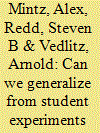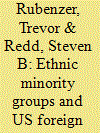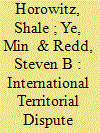|
|
|
Sort Order |
|
|
|
Items / Page
|
|
|
|
|
|
|
| Srl | Item |
| 1 |
ID:
073765


|
|
|
|
|
| Publication |
2006.
|
| Summary/Abstract |
The authors conducted an experiment with a group of military officers and replicated it with a group of students at a public university in the United States. The experimental scenario dealt with a decision problem in the area of counterterrorism. The authors found that while more than one-third of students recommended doing nothing, the overwhelming majority of military officers (more than 90 percent) recommended doing something. Also, military officers exhibited less maximizing and more satisfacing decision making than students. The results show that relying on experiments with students "playing" the role of real-world national security policy makers may bias the results. The two groups are, in fact, very different. Based on student samples, it is possible to accept propositions that would not be found with samples of elite decision makers and reject propositions that may be right. However, it is possible that students can be assigned to experiments where they represent the "public" and not elites.
|
|
|
|
|
|
|
|
|
|
|
|
|
|
|
|
| 2 |
ID:
099112


|
|
|
|
|
| Publication |
2010.
|
| Summary/Abstract |
Previous research on the role of ethnic minority interest groups in US foreign policy has resulted in the development of an extensive list of criteria thought to condition ethnic minority influence. Existing case studies, in spite of their significant contribution, leave open the question of which factors, if any, actually drive influence. The result is a foreign policy decision-making puzzle. We know that ethnic minority groups attempt to influence foreign policy. We also know that foreign policy decision makers sometimes choose the option favored by certain ethnic minority groups. What practitioners and scholars alike do not know is whether decision makers make choices because of the efforts of ethnic minority groups. The experimental designs presented in this study offer the opportunity to solve the puzzle by isolating the impact of diasporic interests on foreign policy decision making at the congressional level. Using a hypothetical foreign policy scenario, the study examines the independent and interactive effects of diasporic numerical significance, diasporic mobilization, and cultural similarity on foreign policy decision making. Results indicate that decision makers are highly responsive to diasporic mobilization, but were unresponsive to diasporic numerical significance and cultural similarity. The overall implication is that small, but highly mobilized, ethnic minority interest groups may be able to significantly influence the development of US foreign policy at the congressional level.
|
|
|
|
|
|
|
|
|
|
|
|
|
|
|
|
| 3 |
ID:
021915


|
|
|
|
|
| Publication |
June 2002.
|
| Description |
335-364
|
|
|
|
|
|
|
|
|
|
|
|
|
|
|
|
| 4 |
ID:
174819


|
|
|
|
|
| Summary/Abstract |
Within international relations theory, there is significant disagreement on the nature and significance of leaders’ dispute outcome preferences. While many variants of realism assume that such preferences are relatively fixed and homogeneous, both the liberal and the constructivist schools view them as significant variables. This debate remains unresolved because, for the standard large-sample conflict data sets, there are no direct measures of leadership preferences over outcomes in given types of international disputes. Using a conflict bargaining experiment, we ask whether, after controlling for the effects of relative power and initial conditions, leadership preferences have a statistically significant impact. We use two different country samples—from China and the United States—to examine whether the impact of leadership preferences varies internationally. We find that realist-style preferences are a special rather than a general case, and that such differences have significant implications for understanding continuities and changes in Chinese and US foreign policies.
|
|
|
|
|
|
|
|
|
|
|
|
|
|
|
|
| 5 |
ID:
159574


|
|
|
|
|
| Summary/Abstract |
In the conflict bargaining literature, three variables have a primary explanatory role: relative power, status quo conditions, and leadership preferences. While leadership preferences loom large in case study research, they are either absent or poorly proxied in large-N statistical studies. Using a series of three experiments, we test for the effects of relative power, status quo conditions, and leadership preferences on decisions to apply various levels of nonviolent and violent pressure in ethno-territorial disputes. The experimental designs presented in this study offer the opportunity to isolate the impact of leadership preferences on political strategy choices in ethno-territorial disputes. The results demonstrate that, at least in an experimental setting, leadership preferences are, in fact, significant predictors of political strategy choices, even after controlling for relative power and status quo conditions.
|
|
|
|
|
|
|
|
|
|
|
|
|
|
|
|
|
|
|
|
|